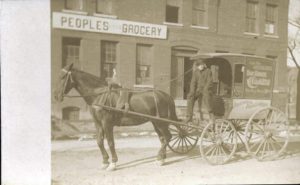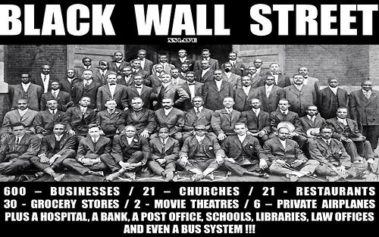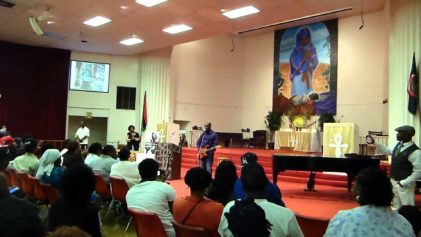
Historic Memphis reports this may be the only photo of Peoples Grocery, which sat at the intersection of Mississippi Boulevard and Walker Avenue known as “the curve.” (Historic Memphis)
In order to build successful African institutions based on a cooperative economic model, we should begin by developing small units of African partnerships not only across Africa but around the world. These small groups can be initiated in childhood and continued throughout life so that when the children mature, they would have been socialized in the purpose of African-centered economics and the necessity of keeping wealth within our own community. As an example, the $1 trillion-dollar Black purchasing power in the United States could be redirected to build the foundation of a global African economic infrastructure and institutions that enable our people to become producers and not just consumers.
Economics is based on the social relations that a group or people have developed with each other over time. Therefore, early childhood education is necessary in order to build awareness around cooperative development so that African youth can be socialized to cooperate with each other, to maintain trustful relationships and as a result, they will be able to buy/sell from each other and set up joint ventures and common businesses.
Cooperative economics is the best model for meeting the needs of African people. An example of a cooperative economic model is Us Lifting Us (ULU), which, by using the collective participation of its membership, is developing small, member-owned businesses that will be the foundation for the building of an economic infrastructure for people of African descent in America and globally. Additionally, ULU promotes supporting other Black businesses that are based on a cooperative/collective economic philosophy.
African people are not poor, however, we perceive ourselves to be poverty stricken because we have been miseducated. Our talents and our economic productivity have not been used to further our own development. Appropriate socialization and education of African youths and Africans globally is essential for the development of trust, which is the basis of establishing a cooperative economic foundation for us as African people.
It is important to note that, indeed, African education is originally cooperative and collective. It is the European culture that we are raised into as children that tends to make us become individualist, private and capitalist. We usually see bank and insurance companies sending letters to newborn babies with the intention of thanking them for being born and at the same time, inviting their parents to open saving accounts that will benefit those institutions.
When it comes to economics, as African people, we must reconnect with our original way of thinking and we must start doing so from childhood. All Black babies should be connected with other African babies worldwide in order to build early cooperation and permanent awareness. Africans can have the best intentions in the world, however, if we don’t bring those intentions to action, we will never remedy our situation and the way to resolve it is by being linked to each other from childhood. That way, we will lay the foundation for the future of a global Pan-African economic structure. This is what ULU is currently developing, ULU is a cooperative economics structure aiming to establish black owned and operated businesses worldwide.
Schools should be our main target, as this is where consciousness is built. European schools are there only to build European mindsets with the ultimate goal being to bring new consumers to the market. Education is therefore the medication to African unconsciousness. Our history with European dominance has always been about educating us to remain divided amongst ourselves in order to better serve their interest:
- Slavery from the 15th century to the 19th century (division and miseducation of Africans)
- Colonization from the 19th century to the 1950s (New countries borders created by Europeans in Africa)
- Immigration from the late 1950s to present (Ongoing miseducation and civil wars amongst Africans)
By accumulating wealth and capital to build big projects, the European domination is a result of geographical and cultural unions — EU-UK-USA etc.— that have all copied the African cooperative models, that Africans will need to reinstate in order to empower their communities. In other words, we have no alternative but to work with each other, for it is a matter of life or death. For us, Black African people, our future is either cooperation or extermination.
Madicke Mboup is a Senegalese citizen currently living in Ireland, he holds a legal Degree from Universite de Montreal in Canada and speaks several different languages. Madicke is engaged in African centered partnerships, he joined the ULU network in 2016. His website is blackdiaspovoice.com and he can be reachable to his email address [email protected].

